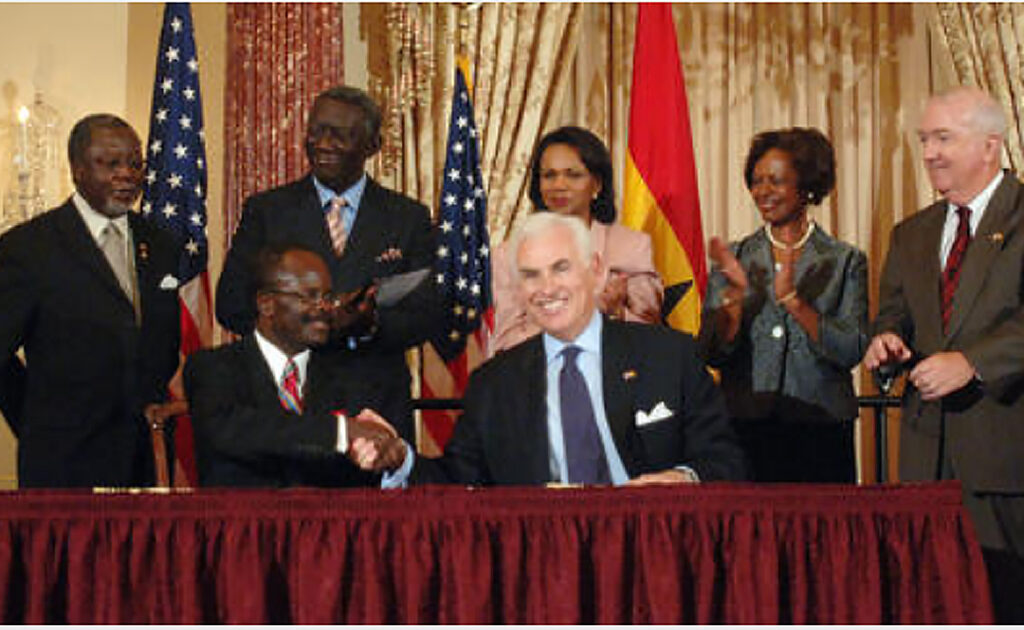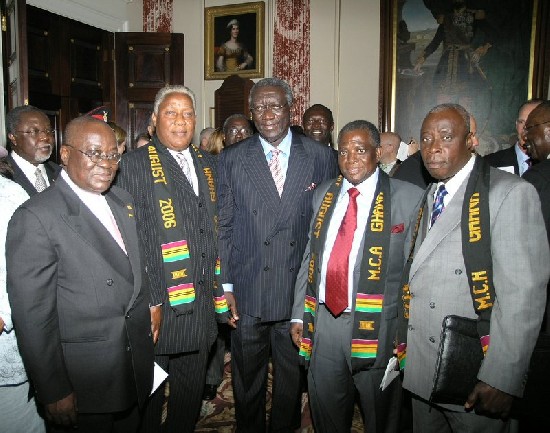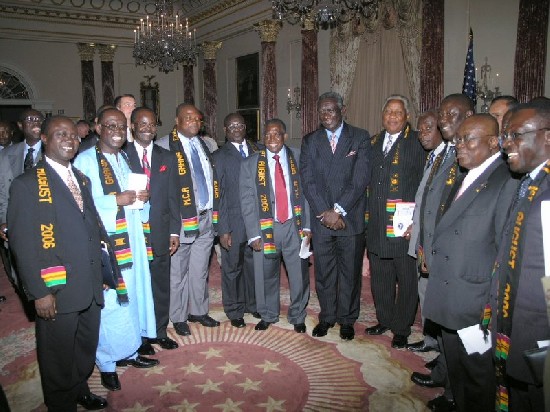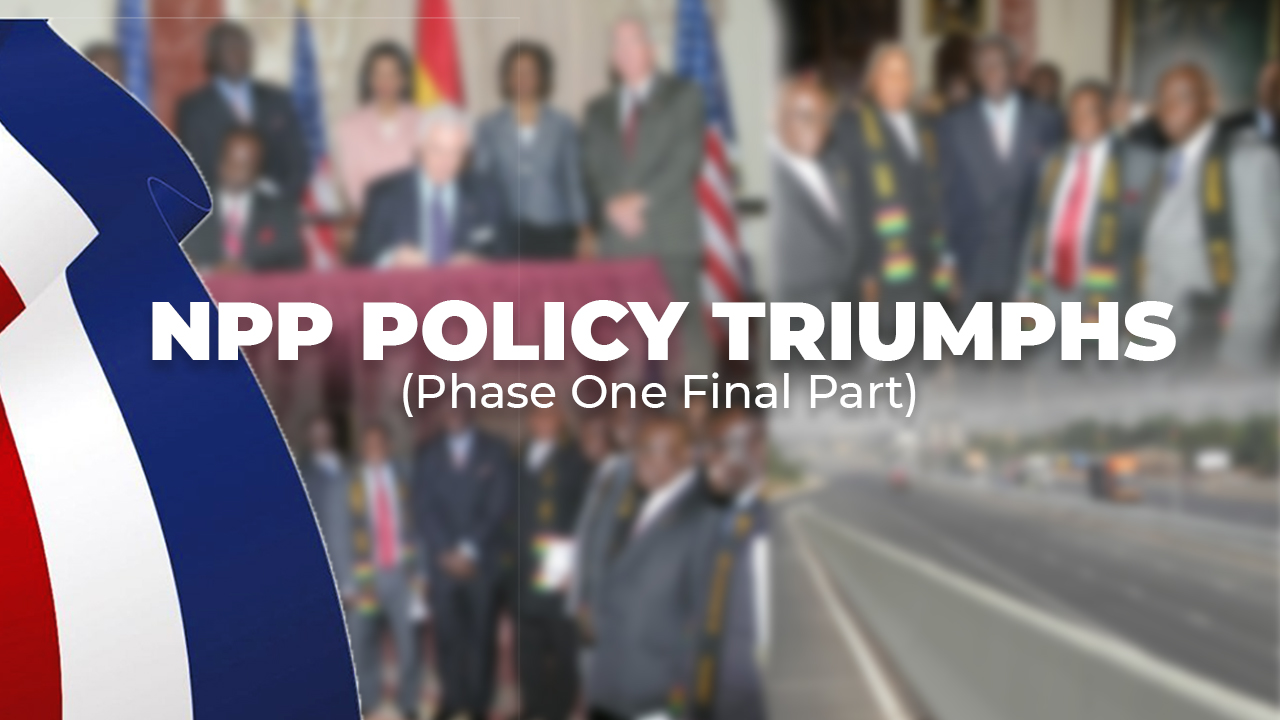*The $547 MCA Compact 1
Story: Richmond Keelson
The Today Newspaper wraps up the first phase of its look back at the policy triumphs of the New Patriotic Party (NPP). The next phase will cover the administration of President Nana Akufo-Addo. The newspaper is also carrying out research into the NDC administrations. In the future, we will re-visit the CPP administration led by Osagyefo Dr. Kwame Nkrumah.
If Ghana is hoping to enjoy the benefits from the existing second compact from the Millennium Challenge Corporation (MCC) of the USA, it is because there was the successful completion of Compact 1.
Compact 2 is a $316 million compact, aimed at helping the Government of Ghana improve the power sector through investments that will provide more reliable and affordable electricity to Ghana’s businesses and households.
The MCC was created by the U.S. Congress in January 2004 under the administration of President George W. Bush. Its purpose was to deliver smart U.S. foreign assistance by focusing on good policies, country ownership, and results. According to the MCC, it provides “…time-limited grants promoting economic growth, reducing poverty, and strengthening institutions.” The MCC has so far invested more than $13 billion to support country-led projects in countries such as Ghana in areas such as:
–Agriculture and Irrigation
–Anti-Corruption
–Education
–Energy and Power (generation, distribution and transmission)
–Finance and Enterprise Development
–Health
–Land Rights and access to Land
–Transportation Infrastructure (roads, bridges, ports)
–Water Supply and Sanitation
The Ghana Compact 1 development team was led by the then Minister for Public Sector Reforms, Dr. Papa Kwesi Nduom. The Technical Project Manager was Mr. Matthew Armah who managed a team of Ghanaian professionals to craft Ghana’s programme. Dr. Nduom led the team in sessions at home in Ghana and in Washington, DC with cooperation and support from personalities such as Dr. Condoleeza Rice, Dr. Jendayi Frazier and Ms. Rosa Whitaker.
The Ghana project passed through the hands of a number Ghanaian officials before Dr. Nduom was invited to the then seat of government at the Osu Castle and asked to take charge to re-design and manage it to successful conclusion by President John Agyekum Kufour, following a meeting with the American Ambassador to Ghana, Ms. Pamela Bridgewater.
According to Dr. Nduom, he is compiling his records to write his account of the journey to this history-making achievement. The Todaynewspaper has chosen to produce photographs associated with the Compact 1 ceremony and project and associated speeches made so that readers and future researchers can understand the objectives of the project and judge for themselves its accomplishments.
Today, the N1 Highway, named the George Walker Bush Highway, which Dr. Nduom and Project Team specifically Matthew Armah and Koranteng Yorke fought for, stands as one of the very few national projects executed successfully on time and within budget.
The project was capped with a multi-partisan 18-member delegation from Ghana to Washington, DC to witness the signing of the compact document by Dr. Nduom. The delegation was led by President Kufuor. It included Nana Akufo-Addo, the current President, E. T. Mensah and Haruna Bayiriga.
Read below the detailed statement made in Parliament on the Compact negotiated between the Millennium Challenge Corporation (MCC) and the Government of Ghana by Dr. Papa Kwesi Nduom, MP & Minister of Public Sector Reform on July 12, 2006.
Introduction
Mr. Speaker,
On Friday, July 7th, the Board of Directors of the Millennium Challenge Corporation (MCC) gave their written consent to the Compact negotiated by the Ghana MCA Project Team and MCC’s Ghana Project Team in June 2006. The Compact is now with the United States Congress for its consideration. It is appropriate that our Parliament is presented with the contents of the negotiated Compact.
Mr. Speaker,
I wish to begin by commending the efforts of the Ghanaian professionals, about 30 of them who have worked very hard to design the Programme and negotiate its acceptance working in collaboration with their counterparts at the MCC. The Ghanaian team included representatives from the Ministry of Justice & Attorney General’s, the Ministry of Transportation, the Ministry of Food & Agriculture, the Ministry of Lands, Forestry and Mines, the Ministry of Finance & Economic Planning, the Office of the President and consultants from the private sector. They have done very well for their country.
Mr. Speaker,
As the leader of Ghana’s MCA Special Task Force, it is important for me to say clearly that the credibility of H.E. President John Agyekum Kufuor and his administration made it possible for Ghana to overcome many hurdles during the course of the application process. The personal attention paid by President Kufuor has encouraged those of us privileged to be a part of the Project team to make the extra effort to make the Compact possible.
Mr. Speaker,
Unlike other traditional development assistance programmeswhere the donor proposes how funds are used, countries selected under the Millennium Challenge Account propose programmes to receive funding. Thus the MCA is designed to allow developing countries to take ownership and responsibility for funds provided by the Millennium Challenge Corporation. I wish to confirm to the HonourableMembers of the House that our professionals have designed a Programme that belongs to us and one that we Ghanaians can implement successfully.
Mr. Speaker,
The MCA is one programme that a country cannot go to the Americans and ask to become a part of. You must be invited to participate in it through a rigorous qualification process. All Ghanaians can take pride in the fact that our country was one of the 16 countries in the world initially selected to participate in the MCA program. Ghana was selected on the basis of three fundamental principles:
1) Governing justly;
2) Investing in people; and
3) Encouraging economic freedom.
All of us have just cause to rejoice over the fact that Ghana is considered to have made progress over the years in the areas of governance and economic opportunity.
Consultation
The consultation process involved in the development of the Ghana MCA compact proposal took into account the key principles of ownership and inclusiveness in a participatory democratic dispensation.
The MCA Ghana team undertook a series of consultations across the length and breadth of the country. More than thirty consultative meetings were held, with an average participation of about forty stakeholders. Various stakeholders took part in these consultations and these included: policy makers, agricultural industry players; farmers; farmer based organizations; exporters, industry associations, environmental groups and organizations, gender organizations, the media and other civil society organizations.
The objective of the consultative process was to select a priority program which is country-owned; in line with government’s broad development strategy; build synergies with existing programs; and promote accountability, transparency and sustainability in the delivery of outcomes.
The major recommendations arising from the consultation process are as follows:
MCA resources must be focused on a limited number of areas in order to achieve maximum impact;
Agriculture endorsed as the priority sector to complement already existing private sector-led government programs;
Constraints need to be removed along the agribusiness value chain in a systematic and integrated manner;
Road infrastructure needs to be improved to spur investment; and
Nation-wide consultations was necessary for arriving at any major policy or resource allocation decision to ensure inclusiveness and country ownership.
Mr. Speaker,
The Goal and Project Level Objectives of the Compact
The goal of the Compact is poverty reduction through economic growth. The Program aims to increase the production and productivity of high-value cash and food staple crops and enhance the competitiveness of Ghana’s high-value cash and food crops in both local and international markets. The three project-level objectives of the Compact are:
a) Enhance the profitability of cultivation, services to agriculture and product handling in support of the expansion of commercial agriculture among groups of smallholder farmers (the “Agriculture Project”);
b) Reduce the transportation costs affecting agricultural commerce at sub-regional and regional levels (the “Transportation Project”); and
c) Strengthen the rural institutions that provide services complementary to, and supportive of, agricultural and agri-business development (the “Rural Development Project”);
Summary of the Agriculture Project and related Project Activities
The Agriculture Project is designed to enhance the profitability of staple food and horticulture crops and to improve delivery of business and technical services to support the expansion of commercial agriculture among farmer-based organizations (“FBO’s), which are groups of eligible farmers, input suppliers selling to these farmers, or output processors buying from the farmers. Funds from the Compact will support the following Project Activities:
Farmer and Enterprise Training in Commercial Agriculture: To accelerate the development of commercial skills and capacity among FBOs and their business partners (including service providers to FBOs and other entities adding value to agricultural crops such as processors);
Irrigation Development: To establish a limited number of retention ponds and weirs request by the FBOs and FBO partnerships for whom access to water is critical to the success of their business objectives;
Land Tenure Facilitation: To improve tenure security for existing land users and to facilitate access to land for commercial crops in the Intervention Zones;
Improvement of Post-Harvest handling and Value Chain Services: To facilitate strategic investments by FBOs in post-harvest infrastructure improvements and to build the capacity of the public sector to introduce and monitor compliance with international plant protection standards;
Improvement of Credit Services for On–Farm and Value Chain Investments: To augment the supply of, and access to, credit provided by financial institutions operating in the Intervention Zones; and
Rehabilitation of Feeder Roads: To rehabilitate up to 950 km of feeder roads in the Intervention Zones in order to reduce transportation costs and time, to increase access to major domestic and international markets, and to facilitate transportation linkages from rural areas to social service networks (including, for instance, hospitals, clinics and schools).
Summary of Transportation Project and Related Projects Activities
The Transportation Project is designed to reduce the transportation costs affecting agricultural commerce at sub-regional and regional levels in Ghana, in support of the Agricultural Project. Funds from the Compact will support the following Project Activities:
Upgrades to Sections of N1 Highway: To reduce the bottleneck in accessing the International Airport and the Port of Tema and to support an expansion of Ghana’s export-directed horticulture base beyond current production, by upgrading of 14 km of the National Highway (“N1 Highway”) between Tema Accra (specifically, the stretch of N1 Highway from TettehQuarshie Interchange to Mallam Road Junction, also known as “TQM”) and by constructing two grade separation interchanges at the Dimples-Achimota and Mallam Junctions to improve traffic management at these locations;
Improvements of Trunk Roads: To facilitate the growth of agriculture and access to social services by rehabilitating or constructing up to 230 km of trunk roads in the Afram Basin Zones; and
Improvements of Lake Volta Ferry Services: To facilitate the growth of agriculture in the Afram Basin Zone by improving the ferry services of Volta Lake Transport Company (“VLTC”) that connect Adawso on the southern shore of Ekye Amanffrom on the northern shore.
Summary of Rural Development Project and Related Projects Activities
The Rural Development Project is designed to support agricultural and agri-business development under the Agriculture Project and to strengthen the rural institutions that provide complementary services. MCC Funding will support the following Project Activities:
Strengthening of Public Sector Procurement Capacity: To support the development of procurement professionals and reinforce the capabilities of the Government to procure goods and services;
Support for Community Services: To complement the Agricultural Project by funding construction and rehabilitation of educational facilities, construction and rehabilitation of water and sanitation facilities and electrification of the rural areas, and by providing capacity building support to local government institutions; and
Strengthening of Rural Financial Services: To automate and interconnect the 121 rural banks and savings and loans institutions and to provide other improvements in the national payments systems that will draw a large number of people currently not served or under-served into the financial system.
Mr. Speaker,
Programme Management
The Compact will be implemented through the management of the Millennium Development Authority (MiDA) which was created by an Act of Parliament (Act 702). MiDA has been created as an independent body to be responsible for the supervision, management and implementation of the Compact.
MiDA will have a Board of Directors, a Chief Executive who will report to the Board and be responsible for the day to day administration of the Authority and a team of Directors who will be responsible for the various units that make up the Authority. The entity will use the Public Private Partnership concept as a vehicle for development so that the end result will be the promotion of growth through the private sector.
Funding
The MCC will grant to the Government an amount not to exceed Five Hundred Forty- Seven Million and Nine Thousand United States Dollars (US$547,009,000) during the Compact Term to enable the Government to implement the Program and achieve the Objectives. The grant will be used in the detailed areas indicated on the attached table.
Mr. Speaker,
In conclusion, we are confident that on August 1, 2006 Ghana will sign the Compact with the Millennium Challenge Corporation at the State Department in Washington, DC. I am very much aware of the interest of all members of this House in the MCA Programme.
I understand the desire expressed by both the majority and minority Members of Parliament to have all regions in the country participate in the projects the funds from the MCC will be used to implement. We have made very good but difficult choices in selecting the initial districts to participate in the Program.
I wish to assure honourable members of this House that during implementation, we will take all steps necessary and possible to make savings, find other funds and seek flexibility to extend benefits from the MCA Programmedesign to other districts in the country
Thank you, Mr. Speaker.







